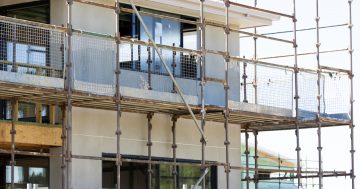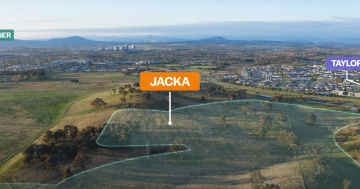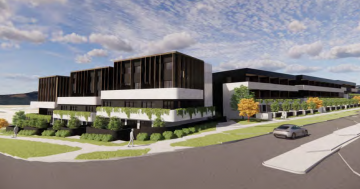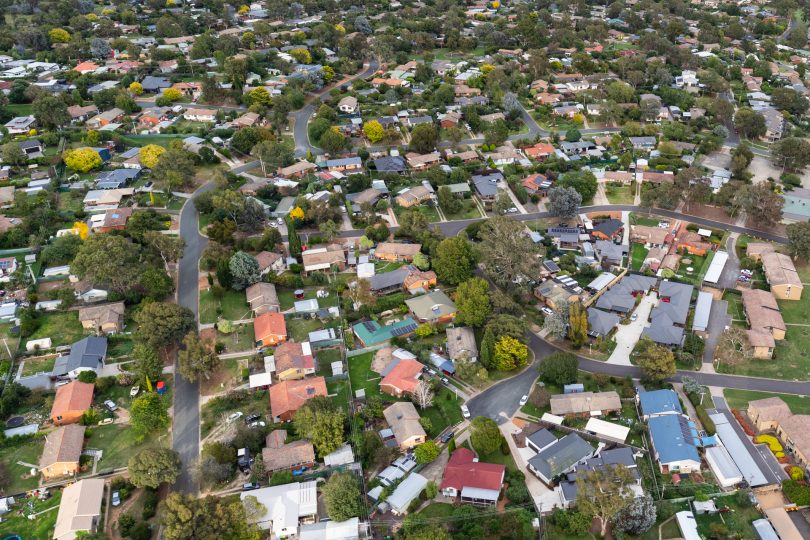
The government wants to see more affordable infill housing in established areas. Photo: Michelle Kroll.
The ACT Government’s push for more affordable housing could end up producing homes that are out of the reach of those being locked out by soaring prices and costs, Master Builders ACT has warned.
CEO Michael Hopkins said the recent increase in Lease Variation Charge (LVC) for residential housing would only add to the price of new homes the government would like to see built in established areas.
On 1 July, the LVC increased from $30,000 to $40,000 per dwelling, the first increase since the government increased it from $7500 per dwelling in 2017. The government has flagged that it would rise again over the next few years to $55,000 per dwelling.
“Our concern here is that at a time when we’re talking about reforming the RZ1 zone and finding ways to deliver missing middle housing, including smaller, more appropriate, affordable housing, the government is increasing the taxes on housing,” Mr Hopkins said.
“The cost to deliver housing already attracts a lot of ACT, federal and other utility fees and charges.”
Mr Hopkins said increasing taxes on housing won’t help to increase supply, and those that may be built won’t be affordable.
He said the government should show restraint on increasing taxes and focus on how it can use the Territory Plan review and other levers within its control to deliver more housing.
The government is hoping that the planning reforms will pave the way for more infill housing by allowing such things as dual occupancy development in RZ1 zones.
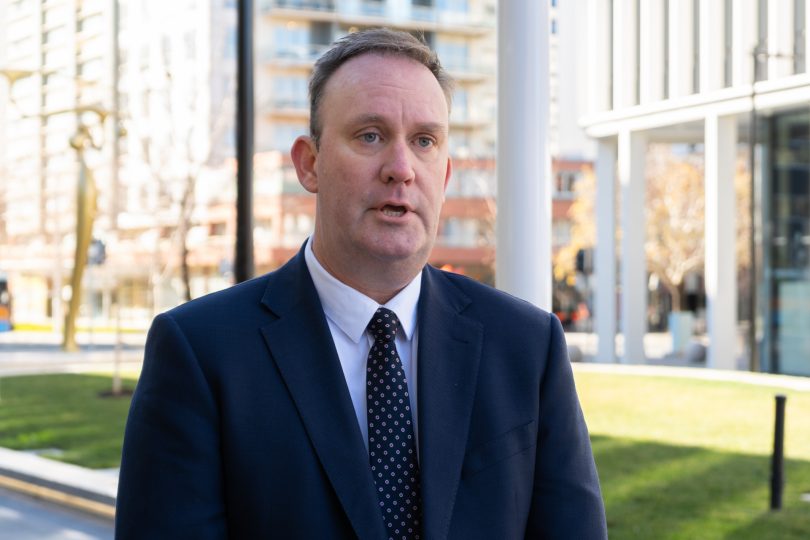
Master Builders ACT CEO Michael Hopkins: more housing choice is needed. Photo: Region.
It rejects the MBA’s claims and says revenue from the LVC supports new housing infrastructure.
But Mr Hopkins said tax increases in the current climate of high inflation and high construction costs would only impact the viability of projects.
“What we know for certain is that taxing something more is not going to lead to the delivery of more housing, no increase in tax ever led to an increase in the supply of housing,” he said.
There were already a range of LVC exemptions but Mr Hopkins said these didn’t apply to housing being delivered in the private market by private builders and developers.
He agreed a more flexible regime that provided concessions for housing types at certain prices could help.
“We need more housing choice in the type of housing but also choice in the price ranges of our housing as well,” Mr Hopkins said. “We need new housing to be delivered in price categories that suit people looking for low, middle and high price categories.”
But he feared that what might result from the planning reforms was an increase in the supply of very expensive homes in the inner suburbs.
“We want to see the planning reforms work so that we can see more affordable, appropriately designed housing in these areas,” Mr Hopkins said.
While the government’s goal of balancing the budget was understandable, Mr Hopkins believed it should be thinking in the long-term about the overall benefits to the ACT economy of increasing housing supply.
“If we don’t provide appropriate housing over the long term to meet community needs, that’s going to have a greater impact on the ACT economy than any short-term benefit of increasing taxes in the current year,” he said.
“If we’re providing housing which is attracting skilled workers to come and move into the ACT to provide the necessary skilled workforce that our businesses are looking for and grow our economy, that is going to benefit the budget much more than short-term moves to increase taxes on housing in any one year.”
Mr Hopkins said the work the government was doing to promote the national capital to attract skilled workers would be in vain if they can’t find appropriate housing for themselves and their families.
He said that despite demand and need the housing starts data was alarming for the ACT, which was usually resilient in the face of big falls nationally, as is occurring now.
Forecasts earlier this year predicted a 55 per cent fall in building approvals in 2023, but it had been actually bigger than that.
“And we’re hearing from our residential members that they’re really concerned about the drop in inquiry they’re getting through their sales offices,” Mr Hopkins said.
“Buyers at the moment are concerned about high interest rates, high lending costs and high building costs. So just as we need to be building more homes at the moment, the figures are telling us that we’re actually building less.”
A government spokesperson said the LVC captured unearned windfall gains from increasing development rights on leases, and revenue was used to support the increased infrastructure and services required when additional housing is built.
The spokesperson said affordable and social housing investment was overwhelmingly driven by government and this year’s budget included $345 million to increase housing choice, access and affordability.
The 2023 update in the LVC would raise $22.4 million over the four-year forward estimates.
“The government has not seen any evidence to support modelling of the MBA cost estimates,” the spokesperson said.
The government already had in place a deferral scheme for the payment of LVC.
“In order to ensure that the benefits of any LVC incentives go to households rather than extra windfall gains to developers, the government does tie incentives to social outcomes,” the spokesperson said.
“The government is currently providing an LVC discount to eligible build-to-rent developments that include a minimum of 15 per cent of dwellings as affordable rental.”












